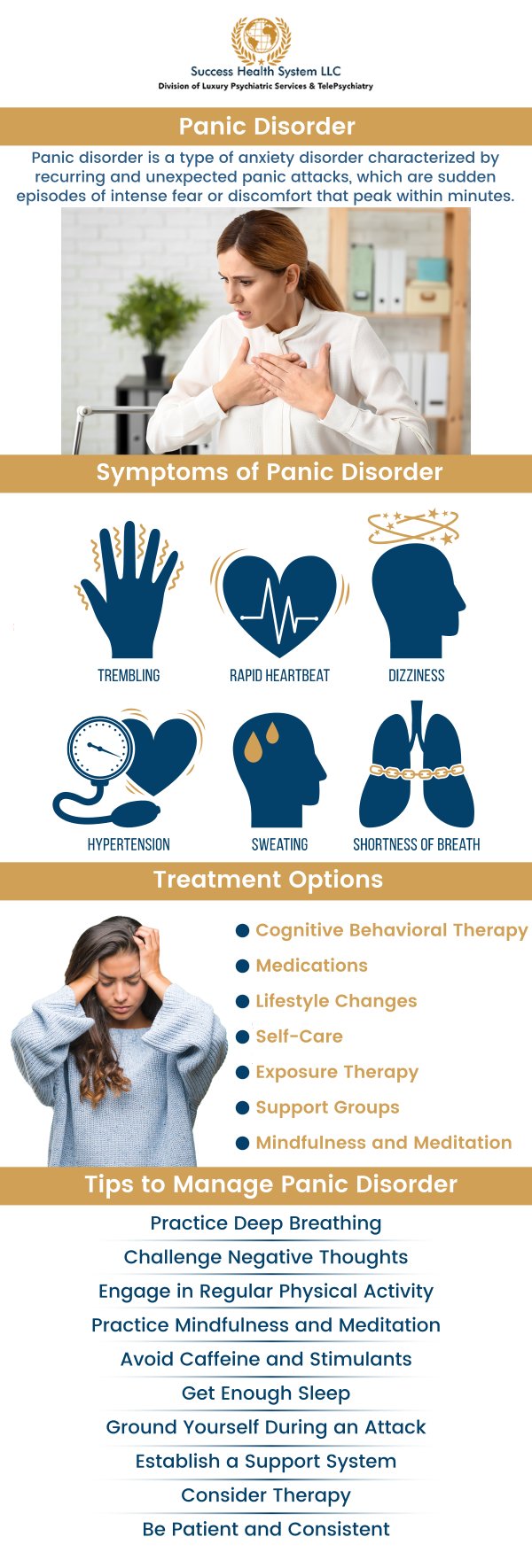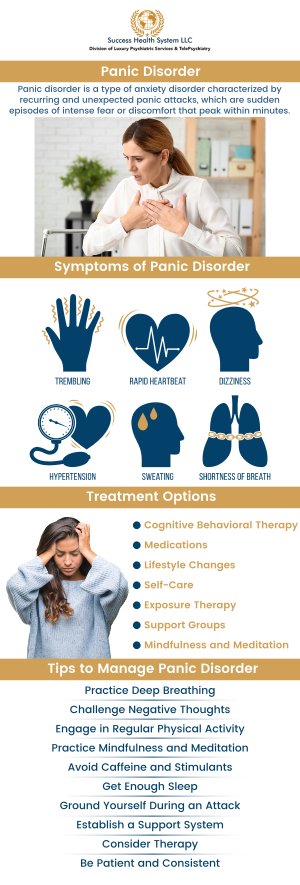Panic Attack Therapist in Columbia, MO
A panic attack is a sudden episode of intense fear or discomfort, often accompanied by physical symptoms like rapid heartbeat, sweating, and shortness of breath. These attacks can occur without warning and may cause individuals to feel out of control. At Success Health System LLC, our board-certified psychiatrist and mental health specialist. Dr. Moses Tabe Ambilichu M.D. will help you to find relief from panic attacks and work with you to deal with them when it happens. For more information, contact us or schedule an appointment online. We are conveniently located at 3600 I-70 Dr SE- Ste C, Columbia, MO, 65201.




Table of Contents:
What is a panic attack?
What does a panic attack feel like?
What is the difference between a panic attack and an anxiety attack?
How long can a panic attack last?
While panic attacks occur without any threat of danger, they can be alarming and frightening to experience and leave one feeling shaken and vulnerable after they end. As such, it is important to take panic attacks seriously even though they do not pose a danger to one’s life or immediate health. At Success Health System LLC, our board-certified psychiatrist and mental health professionals have an abundance of experience and expertise in providing compassionate and thorough care to individuals dealing with panic attacks. We would be pleased to help you find relief from panic attacks and coping strategies for how to deal with them when they happen!
A panic attack is connected to your body’s instinctual fight, flight, or freeze response to danger. With that in mind, a panic attack is your body’s attempt to warn you that you could be in danger so that you can protect yourself. However, panic attacks typically occur without the threat of danger. In this way, a panic attack is your body doing the right thing at the wrong time.
Panic attacks often occur in response to major changes in one’s life, such as divorce or a new baby, or to traumatic or stressful events in one’s past, such as an auto accident, physical, emotional, or sexual abuse or assault, serious injuries, or other events that caused significant pain or distress to one’s mind or body. A panic attack disorder can also have its roots in one’s family history.
Since panic attacks typically occur without an actual threat of danger, the feeling of a panic attack can be incredibly startling and shocking. As such, many individuals who have experienced panic attacks liken the experience to losing control or having a heart attack, as they occur with a sudden rush of intense fear and discomfort. With that being said, panic attacks generally happen with at least four of the following sensations or thoughts:
• Chest pain or discomfort
• Chills or hot flashes
• Dizziness or light-headedness
• Excessive sweating
• Heart palpitations
• Fear of losing control, dying or having a psychotic episode
• Feeling of unreality or being detached from one’s own body
• Feeling of choking
• Nausea, upset stomach, or vomiting
• Numbness or tingling
• Shaking or trembling
• Shortness of breath, the sensation of being smothered, or tightness in your throat
While the symptoms of a panic attack can feel as though you are experiencing a life-threatening medical emergency, it is important to remember that panic attacks are not life-threatening but are instead the presence of a false alarm going off in your body.
The main difference between a panic attack and an anxiety attack lies in their triggers and nature. Panic attacks are typically sudden and unpredictable, occurring without warning and often without any obvious external stressor. These attacks can happen during any activity, even while sleeping, and usually peak within minutes. Symptoms can be severe, including a racing heart, sweating, chest pain, and feelings of losing control or impending doom.
On the other hand, anxiety attacks are generally triggered by a specific stressor, such as a work deadline, an upcoming event, or personal worries. While the symptoms of an anxiety attack can be similar to those of a panic attack, anxiety attacks tend to build gradually as the stressor worsens. Once the stressor is addressed or resolved, the anxiety attack typically subsides.
Both types of attacks can significantly affect one’s quality of life. If you are struggling with either, Dr. Moses Tabe Ambilichu, M.D., a board-certified psychiatrist at Success Health System, can help diagnose and treat your condition with personalized care strategies.
Panic attacks can be overwhelming and distressing, but they are typically short-lived. On average, a panic attack lasts between two and ten minutes. During this time, individuals may experience symptoms like rapid heartbeat, shortness of breath, chest pain, dizziness, and a sense of impending doom. Although the experience can feel much longer, the symptoms typically begin to subside after a few minutes. It’s important to note that while the duration of a panic attack is usually brief, the aftereffects, such as fatigue or lingering anxiety, may last longer.
If panic attacks occur frequently or disrupt daily life, it is advisable to seek professional help. Dr. Moses Tabe Ambilichu, M.D., a board-certified psychiatrist at Success Health System, specializes in treating panic attacks and other anxiety-related disorders. With the right treatment and support, individuals can learn strategies to manage panic attacks and improve their overall mental well-being.
If you are dealing with panic attacks and would like help from a psychiatrist or mental health professional, we would be happy to help at Success Health System LLC! For more information, contact us or schedule an appointment online. We are conveniently located at 3600 I-70 Dr SE- Ste C, Columbia, MO, 65201. We serve patients from Columbia MO, Shaw MO, Harg MO, Deer Park MO, Midway MO, Thornbrook MO and surrounding areas.

Check Out Our 5 Star Reviews


Additional Services You May Be Interested In
▸Addiction Treatment
▸ADHD Treatment
▸Anxiety Treatment
▸Bipolar Disorder
▸Depressive Disorders
▸Mental Disorder
▸Obsessive Compulsive Disorders
▸Psychotic Disorders
▸PTSD Treatment
▸Phobias and Fears Therapist
▸Psychiatrist
▸Substance Disorder
▸Social Anxiety Psychiatrist
▸Medication Management
▸Psychotherapy
▸Exomind TMS – Columbia
▸Spravato – Independence

Additional Services You May Be Interested In
▸Addiction Treatment
▸ADHD Treatment
▸Anxiety Treatment
▸Bipolar Disorder
▸Depressive Disorders
▸Mental Disorder
▸Obsessive Compulsive Disorders
▸Psychotic Disorders
▸PTSD Treatment
▸Phobias and Fears Therapist
▸Psychiatrist
▸Substance Disorder
▸Social Anxiety Psychiatrist
▸Medication Management
▸Psychotherapy
▸Exomind TMS – Columbia
▸Spravato – Independence





